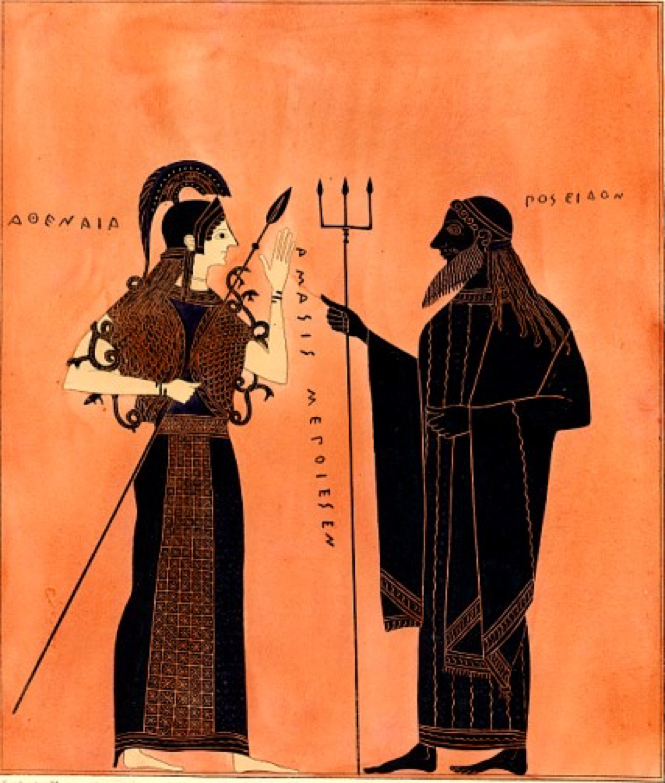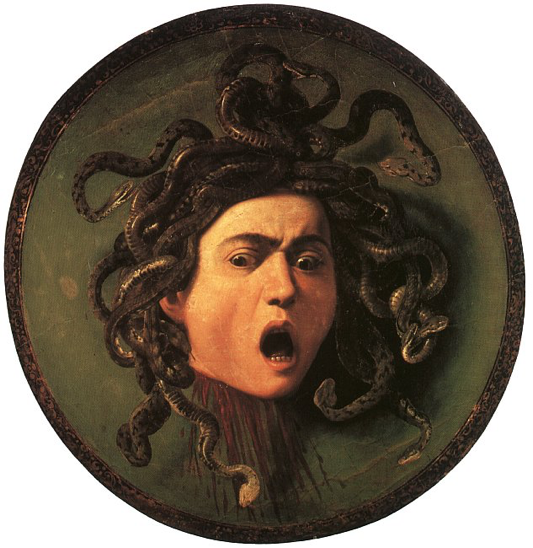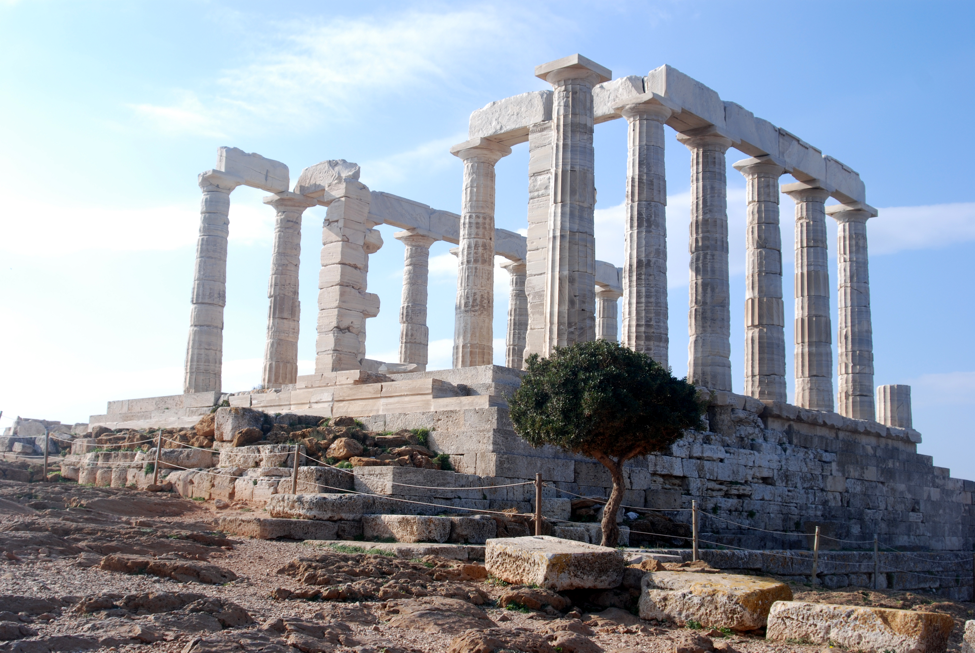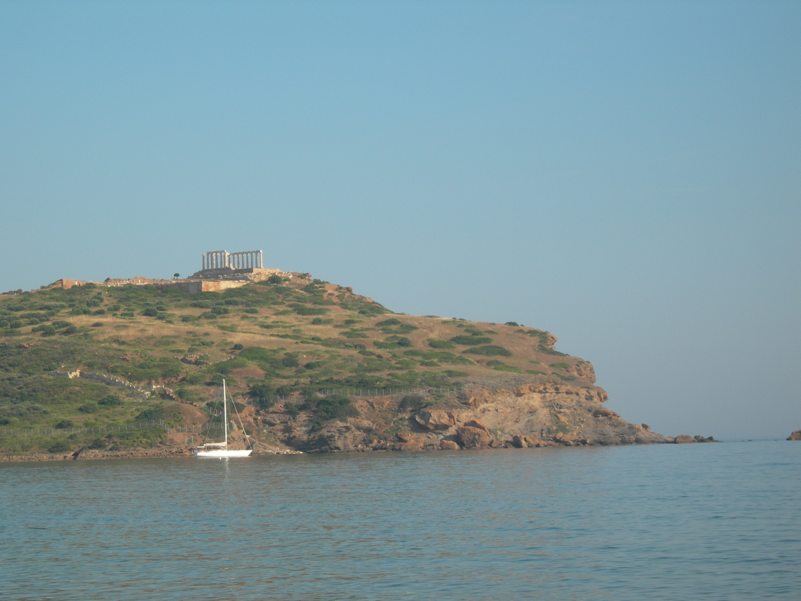Poseidon
Roman name: Neptune
Epithets: Enosichthon (Earth-Shaker), Hippios (the Horse God)
Symbols: trident, horse, bull
Functions: god of the sea, salt and fresh water springs, earthquakes, and horses
Poseidon’s Birth Myth
Poseidon was the son of Cronus and Rhea. Most stories relate that he was swallowed by his father like all his older siblings [see Origins] and was rescued by Zeus along with his other siblings. After the Olympians overthrew their Titan parents, the three Olympian brothers, Zeus, Hades, and Poseidon, drew lots to divvy up the realms. Poseidon was allotted domain over the seas, but he always remained immensely jealous of Zeus’ position of King of the Gods. He once convinced Hera and Athena to join him in a rebellion against Zeus, whom they managed to imprison in chains until Thetis brought Briareüs, the chief of the Hundred-Handers, to release him (Homer, Iliad, 1.396-405).
Poseidon’s Patronage
The gods often competed with each other to win patronage over areas in Greece. Poseidon vied with several of his fellow gods for several areas, and Poseidon did not often fare well in these contests. He and Helius (god of the sun) both wanted Corinth [see Corinthus on map] and could not agree, so they took their dispute to Briareüs, who divided the area between the two, giving the citadel to Helius and the isthmus to Poseidon. Hera and Poseidon fought passionately over Argos [map], and when the three river gods who were given the task of judging the dispute were found in favor of Hera, Poseidon flooded the city and dried up the rivers in anger. Athena and Poseidon argued over possession of Troezen, and Zeus ruled that they would share possession of the city. The most famous of Poseidon’s contests for power was over Athens [see Athenae on map], where he competed unsuccessfully with Athena [see Athena].

Family Life
Poseidon was married to Amphitrite, a daughter of Oceanus and Tethys, and they had a few children, most notably Triton, but like his brother Zeus, Poseidon had a tendency to pursue extramarital affairs. The cyclops Polyphemus (who figures in the Odyssey) was his son by the sea nymph, Thoösa, and he fathered the hunter Orion [see Artemis] with Euryale, the daughter of Minos. Poseidon seduced Tyro (the mother of Aeson and the grandmother of the hero, Jason) in the form of a river and became the father of Pelias [see Jason] and Neleus, who, in turn, became the father of Nestor (who figures in both the Iliad and the Odyssey). Theseus was also a son of Poseidon [see Theseus]. Unlike Hera [see Hera], Amphitrite does not seem to have cared much that her husband often looked for love outside of marriage. In fact, in one version of Theseus’ journey to Crete [see Theseus], when Theseus arrived in Crete, Minos questioned his paternity, and Theseus questioned Minos’. So, each one had to prove to the other that he was the son of a god. Minos prayed to his father Zeus for a sign and received thunder and lightning. Theseus jumped into the sea and Amphitrite gave him her tiara to prove his connection to her husband.
Poseidon’s Affairs
It seems strange that a sea god should be connected to horses, but Poseidon has several myths establishing him as a god of horses. While Demeter was wandering the earth looking for Persephone [see Demeter], Poseidon decided to pursue her. Demeter, trying to avoid her brother, turned into a mare, but Poseidon responded by turning into a stallion and having his way with her anyway. The product of this union was the divine horse, Arion. On another occasion, Poseidon seduced the gorgeous maiden, Medusa, in one of Athena’s temples. Naturally, the virgin goddess was enraged that her temple was so defiled. Athena retaliated by transforming Medusa into a hideous monster with snakes for hair who would turn anyone who looked at her into stone. Later, when Perseus cut off Medusa’s head, the winged horse Pegasus sprang out from her neck, the product of Medusa and Poseidon’s tryst. Pegasus was later tamed by another of Poseidon’s sons, Bellerophon. Peleus, the father of Achilles, was given the immortal horses, Xanthus and Balius, at his wedding by Poseidon. The god was also a friend to the centaurs and helped hide them from Heracles when he waged war on them [see 12 Labors of Heracles].

Poseidon’s Role in the Trojan War
During the Trojan War, Poseidon sided with the Greeks at least in part because he was still angry with Troy for the treatment he had received at the hands of Laomedon, the father of King Priam. Apollo and Poseidon were contracted by Laomedon to build walls around the city. The two gods agreed to perform this manual labor either because they wanted to test him or because Zeus had decreed, as punishment for a rebellion of which they had both been a part, that they work for Laomedon for a year. In any case, at the end of the year Laomedon would not pay them and even threatened to sell them as slaves. Apollo responded by sending a plague, and Poseidon sent a sea monster to terrorize them. Apollo, apparently, did not hold a grudge, since he always favored the Trojans, but Poseidon sided with the Greeks in the Trojan War. Despite favoring the Greeks, however, Poseidon, like Athena, was quickly angered by the less-than-perfect behavior of the victorious Greeks. Poseidon helped Athena punish the Lesser Ajax for his rape of Cassandra during the sack of Troy [see Athena], and he kept Odysseus from his home for ten years to punish the hero for blinding his son Polyphemus.
Poseidon, King Minos, and the Minotaur
To read about this myth, see the Minotaur.

Poseidon’s History
Poseidon seems to be a merging of the Mycenaean god, Poseidaon (meaning “husband of Da”, as πόσις/posis = husband), who may have been the consort of Demeter, and one or more pre-Greek sea gods. Since the Mycenaeans migrated into Greece from central Europe, they had no sea gods and thus had to adapt some of their gods to new functions.


